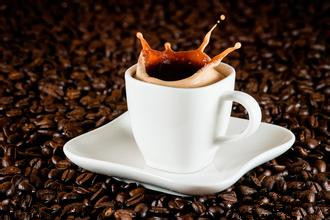The fourth part of the History of European Culture on the Coffee Table what are Europeans doing in the cafe?
A cup of coffee for 350 years
What do Europeans do in coffee shops?
Come to the cafe, of course, first to drink coffee.
Coffee is a magical drink that has been endowed with magical functions as early as the Arab era. With coffee, people think about problems, dream about the world, debate current affairs, and "are the spiritual food of thinkers and chess masters"-yes, Arabs practice chess skills in coffee shops. Come to the cafe, people read, chat, listen to music, play chess, in the smell of fragrant coffee, let rational thought insert romantic dream wings.
Europeans are also a nation of thinkers, and coffee in their hands has become another extreme culture. All alcoholics and gamblers are not allowed outside the café, because people come to cafés to promote intellectual growth. This enthusiasm for cafés grew rapidly, and by 1730 there were nearly 4000 cafés, large and small, in Paris alone, the whirlwind of the future democratic revolution! Elsewhere, in London, Rome, Germany and Austria, there was no time to build new cafes, but rather to convert downtown dining rooms, pubs and even fine hotels directly into tall baroque cafes.
Later, coffee shops have more functions, tea, cocoa, alcoholic beverages, all kinds of dairy snacks and even dishes are available, in some cafes, people can also stay, often until midnight is still brightly lit, very lively.
In order to open up a broader public social life, the high-end cafes of that time spared no expense to build halls that could accommodate dozens or even nearly a hundred coffee tables. For a long time, this was the first and only place in a European city where people of all walks of life could freely come and go. In the midst of all kinds of people, the inspiration of scholars in the café flowed like a fountain, and the essence of human civilization slowly spread from this small coffee table to the whole world.

Important Notice :
前街咖啡 FrontStreet Coffee has moved to new addredd:
FrontStreet Coffee Address: 315,Donghua East Road,GuangZhou
Tel:020 38364473
- Prev

The Fifth History of European Culture on the Coffee Table in the Age of Enlightenment, Democracy stood on the cusp of the wind and waves.
After drinking a cup of coffee for 350 years-in the age of enlightenment, democracy stood on the cusp of the wind and waves, and Europeans became accustomed to autocratic monarchy and succumbed to the orders of kings and theological priests. But the wheel of time turned to the 18th century, when the meritorious King Louis XIV of France launched a foreign expedition. The long war made the people groan everywhere, and the French economy also went downhill.
- Next

The third in the History of European Culture on the Coffee Table the first coffee shop in Paris
After 350 years of drinking a cup of coffee-the first coffee shop in Paris, which was once a bathroom, Procope is the oldest coffee shop in Paris, but its founder is not French, but Mr. Francesco Procopio Dei Coltelli from Palermo, Sicily, Italy, named after its owner. However, the original P
Related
- How did the Salvadoran coffee industry develop in Central America?
- What exactly does the golden cup extraction of coffee mean?
- The Origin of Coffee flower
- [2023 Starbucks World Earth Day] there are more meaningful things besides free Starbucks coffee!
- What kind of coffee is there in Spain? 9 Flavors of Spanish Coffee
- Aromatic African coffee| Kenya's coffee culture and historical production area
- Liberica Coffee Bean knowledge: the characteristics of Liberian Coffee beans of the three original species of Coffee beans
- The origin and formula of Spanish latte introduces the taste characteristics of Bombon coffee in Valencia, Spain.
- How to adjust the solution of over-extracted coffee
- What is the tasting period of coffee beans? What is the period of coffee and beans? How should coffee wake up and raise beans?

